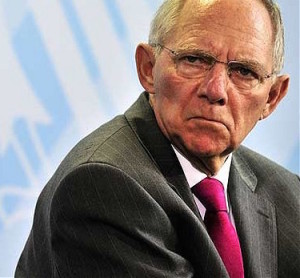There are a number of contentious issues in the conflict between Greece and the European Union over the country’s economic situation. What we hear about in the media are disagreements related to taxes and pensions. The popular perception outside of Greece, and particularly in Germany, is that the Greeks have not been good shepherds of their resources; they retire early with fat pensions and do not pay the taxes they owe. It turns out that those views are outdated; there have been major reforms of the pension system and crackdowns on tax evaders (see the story in this week’s On the Media about that). But popular perceptions are slow to change, especially when there are compelling and long-established stereotypes at work: Germans are industrious; Greeks (and southern Europeans) are lazy. However, there are indeed some striking cultural distinctions of interest.
One of the aspects of the Greek crisis that I’ve been following with interest are the conflicts that have arisen that have nothing to do with money. A few weeks ago, when the Greek prime minister and other officials were in Brussels to continue negotiations, German TV news conducted an interview with Wolfgang Schäuble, the German finance minister. Schäuble said he didn’t think the Greeks were serious about finding a solution to the crisis. Why? Not because their proposals were deficient, but because the Greek delegation wasn’t showing up on time for meetings. He gave specifics. He also commented on the fact that at the time of the interview, in the morning, the Greeks were having a leisurely breakfast, rather than showing up for meetings. For Schäuble, if you are serious about getting work done, the first requirement is that you be on time. The Greek perspective is different, seeing deadlines as less important. When Greek prime minister Alexis Tsipras pulled out of negotiations and announced the referendum that was held last Sunday, he was asked about the problem of missing the June 30 deadline for Greek to pay back 1.6 billion euros. His response: he couldn’t imagine that it would be a problem if there were a delay of a few days while a deal was worked out. Yesterday, the EU officials were flabbergasted that the Greeks did not show up for the meetings of finance ministers with a new proposal. Prime Minister Tsiparas had promised to deliver a new plan within 48 hours, if the Greeks voted “no” in the referendum. The Greeks responded yesterday that they were working on it.
For individuals used to a “monochronic” time orientation (doing one thing at a time; keeping to deadlines), like Schäuble, it was inconceivable that agreed-on time commitments were not kept. For those with a “polychronic” time orientation, time is not seen as segmented, but fluid, and other priorities may have precedence. From the Greek perspective, the Germans were being unnecessarily rigid and unreasonable. The problem here is not really related to being on time, but on establishing and maintaining a cooperative attitude that could lead to a successful negotiation. The Germans, not taking into consideration the different time orientation of the Greeks, interpreted their behavior as one more signal that the Greeks were not serious negotiation partners. The Greeks didn’t help by not being aware of and taking into consideration the German imperative for punctuality. It’s not just the Germans who have this perspective; the Lithuanian prime minister said today that for the Greeks “everything is always mañana“, thus taking a swipe at several different cultures.
This was not the only cultural conflict. Schäuble offered a dramatic contrast in style and tone to the Greek finance minister, Yanis Varoufakis, who announced his resignation yesterday. Schäuble is tight-lipped and serious, being cautious in his pronouncements. Varoufakis, in contrast, is free with his opinions and has not hid his disdain for some EU and German officials. Schäuble wears dark suits with conservative ties; Varoufakis goes for leather jackets. The Greek prime minister also does not wear ties. The German convention is that if you are doing serious business, you dress the part. Of course, the contrast between the two finance ministers is also a case of different personalities, as well as a generational divide. But it remains that if the German and Greeks are far apart on economic issues, they are as well in terms of some social norms and practices.

